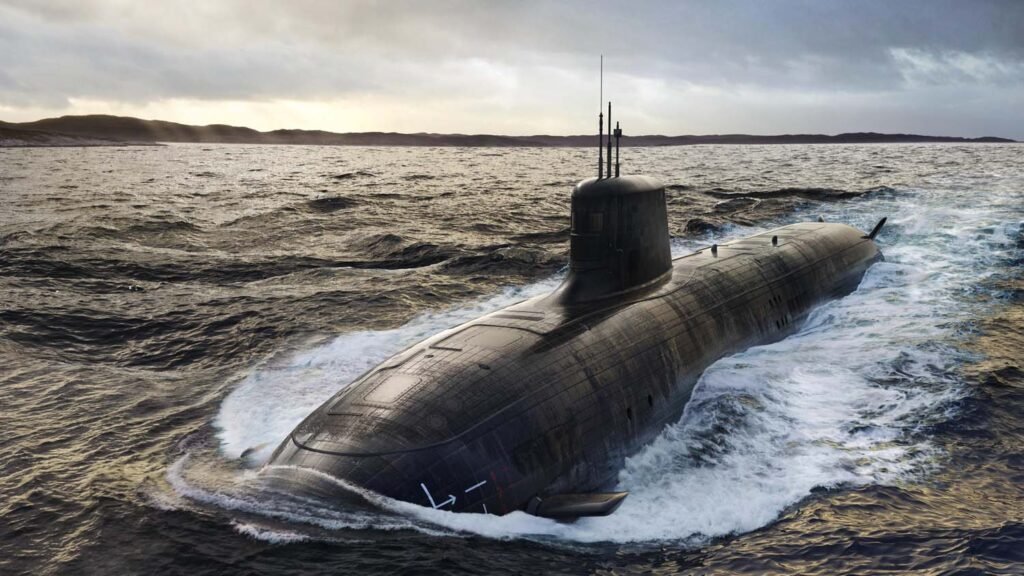Summary – The Aukus pact’s nuclear submarine deal is reshaping Europe’s defense posture amid evolving transatlantic ties and security concerns.,
Article –
The British government’s recent agreement to design, build, and operate SSN-Aukus nuclear submarines marks a significant turn in Europe’s strategic landscape, particularly as it unfolds against the backdrop of a United States review of its security arrangement within the Aukus trilateral pact. This development carries substantial implications for Europe’s defense posture, transatlantic relations, and broader geopolitical stability.
Background
The Aukus trilateral security pact, signed in September 2021 between Australia, the United Kingdom, and the United States, was primarily aimed at countering regional threats in the Indo-Pacific by enabling the transfer of nuclear-powered submarine technology to Australia. As part of this framework, the UK committed to developing the next-generation SSN-Aukus nuclear submarines, representing a new class of stealthy, highly capable attack submarines equipped with advanced technology. The deal signifies a step beyond traditional arms collaboration, involving not only design but full lifecycle operation and maintenance, effectively establishing the UK as a pivotal player in nuclear submarine innovation and production.
Key Players
The principal actors in this strategic endeavor are the UK Ministry of Defence, the Australian Department of Defence, and the United States Department of Defense. The UK’s BAE Systems and its defense engineering partners are tasked with spearheading the design and build phase. On the diplomatic front, British Prime Minister and Defence Secretary have underscored this deal as a “cornerstone of UK defense technology leadership.” Meanwhile, the US is concurrently reassessing its security commitments in Aukus amidst evolving geopolitical priorities, which introduces a degree of uncertainty regarding the full scope and timeline of submarine deployment.
European Impact
This submarine deal affects Europe in multiple dimensions.
- Militarily, the UK’s intensified focus on nuclear submarine capabilities strengthens NATO’s underwater deterrence but may also redirect defense resources towards the Indo-Pacific, raising questions about NATO’s immediate European readiness.
- Economically, the contract bolsters the UK’s shipbuilding sector, preserving high-tech jobs and sustaining critical supply chains, which are interconnected with European defense industries.
- Politically, the Aukus pact and this deal hint at a recalibration of Europe’s alliances, as some EU member states navigate the balance between maintaining closer ties with the US and addressing emergent security concerns along the European periphery.
Wider Reactions
European Union (EU) officials have responded cautiously, emphasizing the importance of reinforcing European defense autonomy alongside transatlantic cooperation. The European Defence Agency (EDA) highlighted the necessity for Europe to invest in submarine capabilities and advanced naval technologies to maintain strategic independence. Member states such as France, with vested submarine programs, expressed the importance of collaboration without duplicate efforts that might fragment defense unity. Regional neighbours also watch closely, as the deployment of advanced submarines in distant theatres may alter NATO’s focus, affecting collective security dynamics.
Defense analysts noted that while the Aukus deal signifies a robust commitment to Indo-Pacific security, it simultaneously raises questions about resource allocation and priorities within NATO. Dr. Elena Müller, a strategic security expert, observed, “Europe must reconcile the benefits of Aukus-enabled technological advances with the imperative to safeguard its own maritime borders and interests.” Furthermore, the US review of its Aukus role injects an element of unpredictability, potentially influencing the pace and extent of submarine production and deployment.
What Comes Next?
Looking ahead, the execution of the SSN-Aukus submarine project will unfold amid complex geopolitical challenges.
- Should the US reaffirm or even deepen its commitment to Aukus, the UK and Australia may accelerate their programs, possibly stimulating a wave of naval modernization within NATO allies to maintain parity.
- Conversely, if the US recalibrates its security posture, European actors may face pressure to assume greater naval responsibilities independently.
In parallel, the EU’s strategic autonomy agenda is likely to gain momentum, encouraging investment in indigenous defense capabilities including submarine technology. This could trigger new collaborative frameworks among EU member states, aimed at avoiding fragmentation and reinforcing collective maritime security. Additionally, the technology transfers associated with the Aukus submarines may influence future arms control discussions and nuclear non-proliferation debates within Europe.
The Aukus deal’s unfolding story is emblematic of the shifting tides in global security arrangements and technological defense partnerships. As European governments assess the longer-term ramifications, the integration of such nuclear submarine programs into the continent’s strategic fabric remains a critical consideration.
Stay tuned to Questiqa Europe for more regional perspectives and insights.

More Stories
Why Brussels Is Watching India’s New Trade Model Amid EU-India Relations
Why Europe Is Watching India’s Trade Diplomacy Amid US Pressure on Agriculture
Why Dover’s Migrant Crisis Is Forcing Europe to Rethink Border and Migration Policies